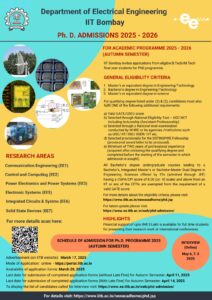Students will be introduced to different areas in EE, with the goal of exposing students to the historical development of that area, major milestones, people who made seminar contributions, ethical issues, standardization, and cutting edge research in that space.
History of our understanding of electricity; The 1820s: Discoveries of Oerstead, Ampere and others; Review of circuit theory, network theorems Electromagnetism: The work of Faraday, Maxwell, Hertz; Maxwell’s equations; Transmission of EM waves Telecommunication: Telegraphy, the telephone; Radio and television; The theory of communication: The work of Shannon; Canonical problem of wireless transmission of a message signal and the engineering issues therein; Sampling and quantization; Fourier analysis; Source and channel coding The history of electric lighting; Electrical power: Dynamos, generators, motors; Structure and history of electrical power grids; AC and DC Motors and Generators; AC to DC converter & DC to AC converter (Home Inverter example); Solar cells fundamentals
Control theory: Control systems fundamentals; Feedback and Stability Digital Electronics: Turing machine; Vacuum diodes, Miniaturization of electronics; Concept of digital bits; Huntington postulates and Boolean Algebra; Basic Gates; Construction of gates using diodes and transistors with special emphasis on MOSFETs; SRAM and DRAM; Memory Architectures; Concept of VLSI integration and digital modules; Integrated Circuits with and without memory. Moore’s law.
Text/ References:
1) Dunsheath Percy, A history of electrical engineering, Pitman, 1962.
2) Atherton W. A, From Compass to Computer: History of Electrical and Electronics Engineering, Macmillan International Higher Education, 1984.



